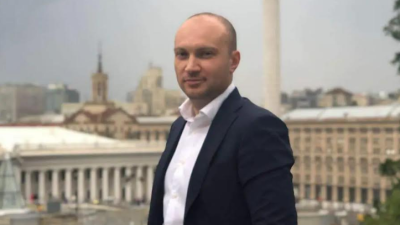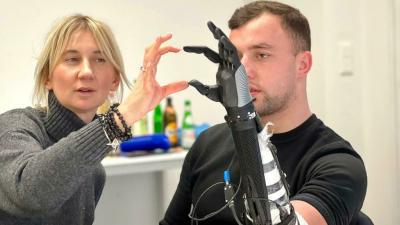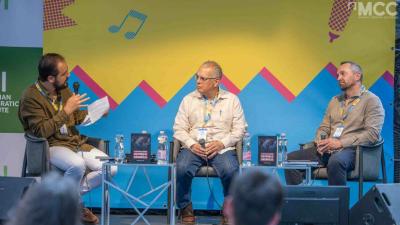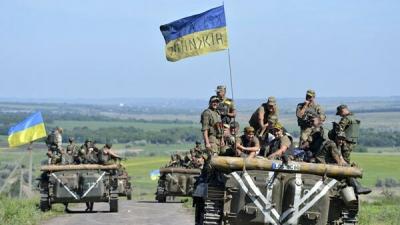“Presenting truthful information that shows the reality in Ukraine is crucial to dispel doubts”: An Interview with Andrey Buzarov
Andrey Buzarov is an international relations expert, political adviser, and consultant. He has a Ph.D. and a master’s degree (foreign policy, Ukraine). He is a postdoctoral research fellow in the Kuras Institute of Political and Ethnic Studies of the National Academy of Sciences of Ukraine, and a researcher in the Department of Public Administration and Political Sciences at Klaipeda University (Lithuania).
Álvaro Peñas: You have done work both in Ukraine and abroad. What is your overarching aim?
Andrey Buzarov: From the beginning of the full-scale invasion, I was involved in humanitarian work to get help for Ukraine abroad. Before the war, I had established a large number of political, business, and journalistic contacts. So I used those contacts in order to help our army and the population. Basically, addressing all questions related to logistics, storage, and transportation of humanitarian aid to Kyiv, Kherson, and other places, with the help of different organisations.
On the other hand, as a professional researcher, I have tried to do informative work to explain to our European partners what is happening in Ukraine and, at the same time, to explain in my country what is happening outside. Both activities are connected because, in order for help to arrive, it is necessary to understand the real situation.
You have recently been at the Munich security conference, where there was significant support for Ukraine. Is this really the case, and do you get the impression that sometimes there is more talk than action?
Yes, I was also there the year before, so I can compare the two events. My conclusion is that last year there were many more declarations of support for Ukraine, but, as the German diplomat Wolfgang Ischinger — who was president of the conference until 2022 — points out, they were mostly based on the conviction that our counter-offensive would destroy the Russian army and that the war would not be a long one. This year, there have not been so many declarations; but now the real help, the practical help, is much more concrete. I mean that it is not just words, as was the case a year ago, but military cooperation agreements, such as those signed with the United Kingdom, Germany, France, and Italy. For its part, the United States has committed to signing agreements on the eve of the NATO summit in July, and there are also agreements with the European Union. There is more unity in support for Ukraine, although perhaps not as much as we would like, for example, with NATO membership or greater military integration with allies in security and defence.
Given what has happened in recent weeks with U.S. aid, do you think that these commitments may turn out to be worthless?
The problem with U.S. aid, as with other Western countries, is not Ukraine’s fault, but a consequence of the politicisation of this support. The underlying problem is that an issue that should be considered from a foreign policy point of view has become a domestic policy issue. During the Munich conference, I asked Senator Chris Murphy about this matter, and his response was that the political divisions between Democrats and Republicans are growing and causing Ukraine aid to be seen not as a matter of national interest, but as a political action by Joe Biden — which, in turn, makes many Republicans oppose it head-on. Unfortunately, this makes us hostage to circumstances, but we have also seen that other countries are stepping forward.
Do you think Europe finally understands what is happening in Ukraine?
I think Europe does not fully realise what is going on, how serious the situation is, and what we Ukrainians are suffering because of this invasion. This is largely because pro-Russian narratives are being spread throughout Europe, misinforming and confusing people. Some may not be as direct as they were before the full-scale invasion, or during the 2014 aggression, but they persist in all EU countries through Russian money, assets, and influence. We have seen these narratives creep into political debates in different countries and from different ideological spectrums, and even if they have not succeeded in changing the common European stance towards Russia, they represent a serious challenge. This is why I believe that one of the future priorities for Ukrainian foreign policy and cooperation with Europe is to counter Russian disinformation campaigns in the European Union.
How do you combat such disinformation?
In Ukraine, we have been fighting Russian disinformation since 2014. We have seen first-hand what they do and the nature of their crimes, and we are well aware of how they use propaganda to hide these facts. But in Europe, in 2014, many did not realise the seriousness of the Russian aggression and echoed a lot of news born from propaganda. Regarding the current situation, there is a need for close collaboration between journalists, political scientists, specialists, and opinion leaders in the EU and Ukraine to find a way to identify the Russian narratives that have filtered into the EU. Now, the Russians are not using classic propaganda methods; they are no longer using direct propaganda and they are much more subtle in influencing the consciousness of Europeans, using open intelligence sources and social networks to manipulate public opinion. Unfortunately, I believe that many politicians and influential people in the EU have been influenced by Russian propaganda, and we alone cannot fight all these lies. We need support from journalists and European institutions and to find a method to identify the different narratives of Russian propaganda.
The Baltic states and Poland have been the most active in helping Ukraine. Would we be in a different situation if the rest of Europe had acted in the same way?
Yes, the Baltic countries and Poland have shown unconditional support, but we should also mention the United Kingdom, the Scandinavian countries, Romania, the Czech Republic, and also Spain, which is training our soldiers. This is a very important contribution because not all of our supporters do this for our army. If all European countries had acted in this way, it is obvious that the situation would be different and much more favourable for everyone, but it is understandable that this has not been the case because there are different policies and interests at stake in each country of the European Union. That is why presenting truthful information, which shows the reality of what Ukraine is going through, is crucial and why journalistic work is so important to dispel doubts and keep the focus on what is happening. For example, when the crisis in the Middle East erupted with the Hamas attack on Israel, the media forgot about Ukraine, and that clearly favoured Russia. We cannot allow that to happen again.
* This interview was originally published on: “Presenting truthful information that shows the reality in Ukraine is crucial to dispel doubts”: An Interview with Andrey Buzarov ━ The European Conservative
Read also
Manuel Veiga Aldemira: "Technology gives a second life to many Ukrainians, some soldiers have even returned to the front"
Manuel Veiga Aldemira: I have been involved in supporting Ukraine since February last year, from the very beginning of the invasion.
Álvaro Peñas
Alejandro Peña Esclusa: “We must create a mass movement capable of defeating cultural Marxism”
In my previous article, “That wonderful feeling of normality”, I commented on the enormous variety of debates organised by the Mathias Corvinus Collegium.
Álvaro Peñas
Spain turns right and Sánchez calls elections
The local and regional elections held on 28 May marked a turning point in Spanish politics. The most obvious summary is a clear victory of the Right and a debacle of the Left, whose most radical version practically disappears from the institutions.
Álvaro Peñas
Kursk: Putin’s Achilles heel?
The operation by Ukrainian forces in the Kursk region of Russia has been one of the most unexpected actions since the Russian invasion began in February and has so far drastically changed the map of a war that had been slowly changing since the recapture of Kherson and much of the Kharkov region.














Comments (0)